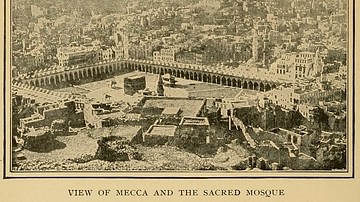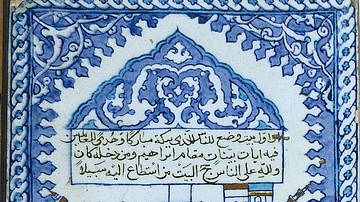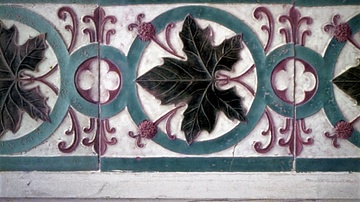Illustration
This rectangular tile depicts a stylized view of Mecca, with the black-shrouded Ka‘ba in the center of the Masjid al-Haram and other buildings within and around the holy sanctuary. It is part of a larger material corpus related to the Hajj, the pilgrimage to Mecca and sites in its vicinity, which each pious Muslim should perform once in his or her life. Such Ka’ba tiles were a favored theme in Ottoman tile workshops. This one is painted in the traditional color palette used in seventeenth century Iznik tiles. However the bird’s-eye view, inspired by the European pictorial tradition, is a characteristic of later examples made at Tekfur Sarayi in Istanbul, a less well-known Ottoman ceramic workshop. Made by Osman Ibn Mehmed, c. 1720-30 CE. Stonepaste, polychrome paint. 35 cm (13.8 in) x 26.1 cm (10.3 in). Collection of the Metropolitan Museum of Art.
Cite This Work
APA Style
Mehmed, O. I. (2021, March 06). Ka'ba Tile. World History Encyclopedia. Retrieved from https://www.worldhistory.org/image/13562/kaba-tile/
Chicago Style
Mehmed, Osman Ibn. "Ka'ba Tile." World History Encyclopedia. Last modified March 06, 2021. https://www.worldhistory.org/image/13562/kaba-tile/.
MLA Style
Mehmed, Osman Ibn. "Ka'ba Tile." World History Encyclopedia. World History Encyclopedia, 06 Mar 2021, https://www.worldhistory.org/image/13562/kaba-tile/. Web. 08 May 2025.






